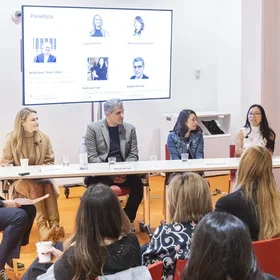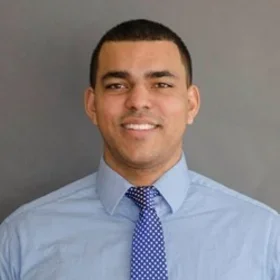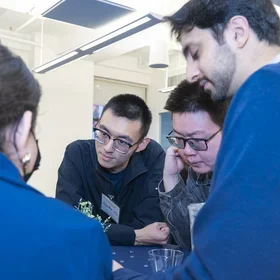By Valerie Chung ('24SPS, Bioethics)
Through a unique collaboration between the University of Hong Kong (HKU) and Columbia’s M.S. in Bioethics and Visiting Student programs, HKU students pursuing a medical degree have the opportunity to come to Columbia to earn a master’s degree in Bioethics. I am lucky enough to have been one of these students, and my year at Columbia was transformative in my academic journey.
For a medical student from Hong Kong, moving halfway across the world to pursue an M.S. in Bioethics at Columbia University felt like stepping into a new life. At home, seasonal transitions are subtle; I found it awe-inspiring to see the vibrant red and yellow leaves that carpeted the Low Library steps and the blue hydrangeas that later bloomed in their place. Witnessing Columbia’s campus transform through all four seasons was magical, yet nothing could have prepared me for the incredible year I would experience.
Academically, the program was everything I had hoped for and more. The classes offered a comprehensive and diverse exploration of health care delivery and global health care practices. One of my favorite courses was Special Topics in Clinical Bioethics, which invited professionals in the field to tackle complex and often overlooked ethical issues, such as physician participation in interrogation and execution. It prompted me to think about whether this should be the responsibility of doctors and whether safety during executions or the reputation of medical professionals should be prioritized.
Coming from Hong Kong, where health care often intertwines with family values and even traditional Chinese medicine, I also found it fascinating to compare these practices with the U.S. health care system and those of other countries, which had always seemed somewhat of a mystery to me. This cultural lens inspired me to write my master’s thesis on cultural sensitivity in end-of-life discussions with terminal cancer patients. It is a topic close to my heart, and the program provided me with a solid foundation to explore how different cultures approach such matters.
What truly stood out, however, were my classmates. Each person brought their own perspective to the table, and I loved having the opportunity to speak to lawyers, researchers, and fellow aspiring doctors. The diversity of ideas and lively discussions made every class a space for growth and reflection, and the friendships I made this year are ones I will treasure forever.
Outside the classroom, living in New York City was a dream come true. There’s an energy to the city that is impossible to describe but easy to feel. The city became my classroom as much as Columbia itself, as each weekend felt like a new opportunity to uncover something exciting, whether it was watching a new Broadway show, wine tasting in the Hamptons, or admiring the West Side tulip garden. Most of my memories with my friends involve us sitting around a table laughing over a shared meal. Despite the occasional frustrations of losing in the reservation battle on Resy, we ate our way through New York’s incredibly diverse food scene, from Armenian classics and Egyptian seafood to checking off as many Italian restaurants in the West Village as we could. We loved sharing our culture through the universal language of food.
As I look back, my year at Columbia feels like a collection of moments that shaped me in ways I couldn’t have guessed. It wasn’t just about the lectures or coursework but also about the conversations that challenged my assumptions and deepened my appreciation for the complexities of health care systems around the world. Columbia gave me more than just academic knowledge—it gave me the tools to approach ethical dilemmas with nuance, the confidence to share my voice, and the understanding that no health-related problem exists in isolation from culture, history, and humanity. I can confidently say that the program has prepared me to be a doctor with empathy and an extensive knowledge of bioethical issues.
About the Program
Columbia University’s Master of Science in Bioethics program grounds students in interdisciplinary approaches and models to address pressing bioethical challenges such as stem cell research and health care reform. The program prepares students to act as responsible and responsive leaders in this new and ever-growing field. It also includes a concentration in global bioethics—the first of its kind in the U.S. Columbia’s Bioethics program offers a range of degrees and courses.
The fall 2025 application priority deadline for the M.S. in Bioethics program is February 15. The final deadline is June 1. Learn more about the program here.


